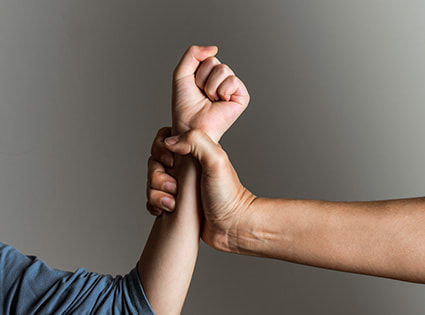Domestic Violence in Alaska
Domestic violence is a complex issue we face in Alaska, it is a crime, and it affects everyone in our society. The consequences of domestic violence such as loss of employment, inability to pursue educational opportunities, and homelessness can have financial impacts on our communities.
According to the National Coalition Against Domestic Violence (NCADV) domestic violence occurs when there is intentional intimidation, physical assault, sexual assault, threats, and emotional abuse done by another person who is related to you as a family member, ex-spouses, intimate, and former intimate, cohabitants, dating, and former dating, couples. Under Alaska law, it is illegal for another person, even if they are related to you, to hurt you physically in any way, to force you to have sex when you don’t want to, to threaten to hurt or kill you or your children, or to destroy your property. Domestic violence is not a heterosexual issue, nor is it limited to certain races, ethnicities, abilities, or socioeconomic status. It reaches every corner of our society. It does not respect class, race, religion, culture, or wealth. It is a social epidemic that can affect anyone and everyone. In Alaska, nearly 60% of women experience intimate partner violence, sexual violence, or both during their lifetime, according to the Alaska Victimization Survey conducted in 2020 by the University of Alaska’s Justice Center Department, and the Council on Domestic Violence and Sexual Assault. The key lifetime results of this survey show that out of 100 adult women who reside in Alaska, 48% experienced intimate partner violence, 41% experienced sexual violence, and 58% experienced intimate partner violence, sexual violence, or both during their lifetime. These results show a 14.7% increase from a similar study conducted in 2015. Victims should know that reporting domestic violence to the police or requesting a protective order will not subject them to deportation. U.S. law provides several protections for legal and undocumented immigrants who have been victims of a crime. Often victims are unaware of such protections. If you are a victim and you fear deportation for reporting abuse, please go to https://www.dhs.gov/immigration-options-victims-crimes to learn more about protections offered to undocumented immigrants who have been victims of a crime. Also, if you want to learn more about victim’s rights, go to the State of Alaska Office of Victims’ Rights website https://ovr.akleg.gov/rights.php If you or a loved one is a victim of domestic violence or sexual assault, the following resources are available to you 24/7 and at no cost: • For immediate response call 911 • Alaska 2-1-1 for assistance, referrals, and resources • National Domestic Violence Hotline. Call 800-799-7233. Text “START” to 88788; or Online chat at www.thehotline.org • National Sexual Assault Hotline at 800-656-HOPE (4673) • Abused Women’s Aid in Crisis Inc. (AWAIC) crisis and support line 907 272-0100 • Standing Together Against Rape Inc. (STAR Alaska) 907 276-7273 or Toll-free statewide (800) 478-8999 For a more listings of local victim services 24/7 hotlines, go to https://dps.alaska.gov/CDVSA/Services/VictimServices References: - Alaska Victimization Survey (AVS) | Justice Center | University of Alaska Anchorage - https://www.law.alaska.gov/department/criminal/victims_assistDV.html - https://ncadv.org/ - https://www.dhs.gov/immigration-options-victims-crimes - https://ovr.akleg.gov/rights.php |
